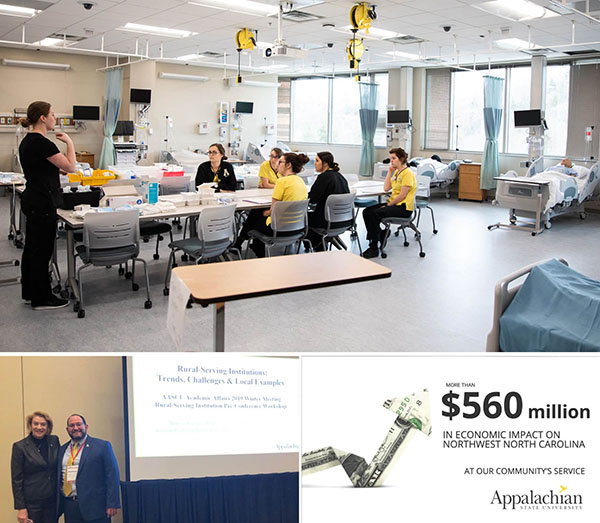Leading the Way
On Thursday, along with Dr. Andrew Koricich — an assistant professor in the higher education program in our Reich College of Education — I addressed the American Association of State Colleges and Universities (AASCU) pre-conference meeting of provosts and other campus representatives.
We were asked to lead the discussion on rural-serving institutions, sharing challenges and best practices for regional stewardship.
Rural service is not a new concept for our university: Watauga Academy was founded to improve access to education for the rural residents of Western North Carolina.
In 2017, Appalachian entered into an agreement with the UNC System to continue prioritizing recruitment and retention of low-income and rural students. Doing so requires both strategic planning and tactical execution.
Both Andrew and I grew up in rural communities and are keenly aware of the particular challenges first-generation, small-town and rurally located students encounter when attending postsecondary institutions. Appalachian’s student demographics are revealing. In the 2017–18 academic year:
- 68 percent of Appalachian students received some type of aid.
- 30 percent of undergraduates were recipients of Pell Grants.
- 2,405 students (around 12 percent) were at or below the federal poverty guidelines.
As we fulfill our promise to recruit higher percentages of rural and first-generation college students, I am proud of our efforts to ease the transition to college for these students. Data show that, once enrolled, these students thrive academically, taking the courses they need to graduate and passing classes at high rates. As a group, they stay on track for excellent four- and five-year completion rates.
We have strong support systems and initiatives in place. Contributions from each of you — faculty, staff and students — factor greatly in our leading role as a rural-serving institution. Your ideas are key as we develop strategies and tactics for improvement. Our staff excels at advising, preparation and early intervention, and our faculty understand the importance of the rural context in which we live and work. Student peer support bolsters resiliency and retention.
Rural service also includes service to our community, state and region. Appalachian contributes positively to quality of life in the High Country and beyond; prepares professionals for positions in critical job categories; and adds to the economic well-being of the region and state. In 2012, economists in Appalachian’s Center for Economic Research and Policy Analysis estimated that the university’s annual economic impact was worth $560 million to the local economy and supported approximately $36 million in additional taxes to local governments.
Of the nearly 127,000 App State alumni, more than 75 percent live and work in North Carolina, contributing to our state’s growing economy. While these numbers are critical to the local economy, they do not begin to capture the broader impacts to society at large that arise from the academic mission of the university. Our new Innovation Campus will allow us to foster collaborative opportunities for students, investors and businesses throughout the region with an emphasis on creative and innovative thought and research.
Rural service is not a trend for Appalachian. It is our legacy from our founders, the Dougherty brothers and Lillie Shull Dougherty. It was the underlying purpose of Watauga Academy, of Appalachian Training School, of Appalachian State Teachers College. We are leading by example.

Sheri Everts, Chancellor
